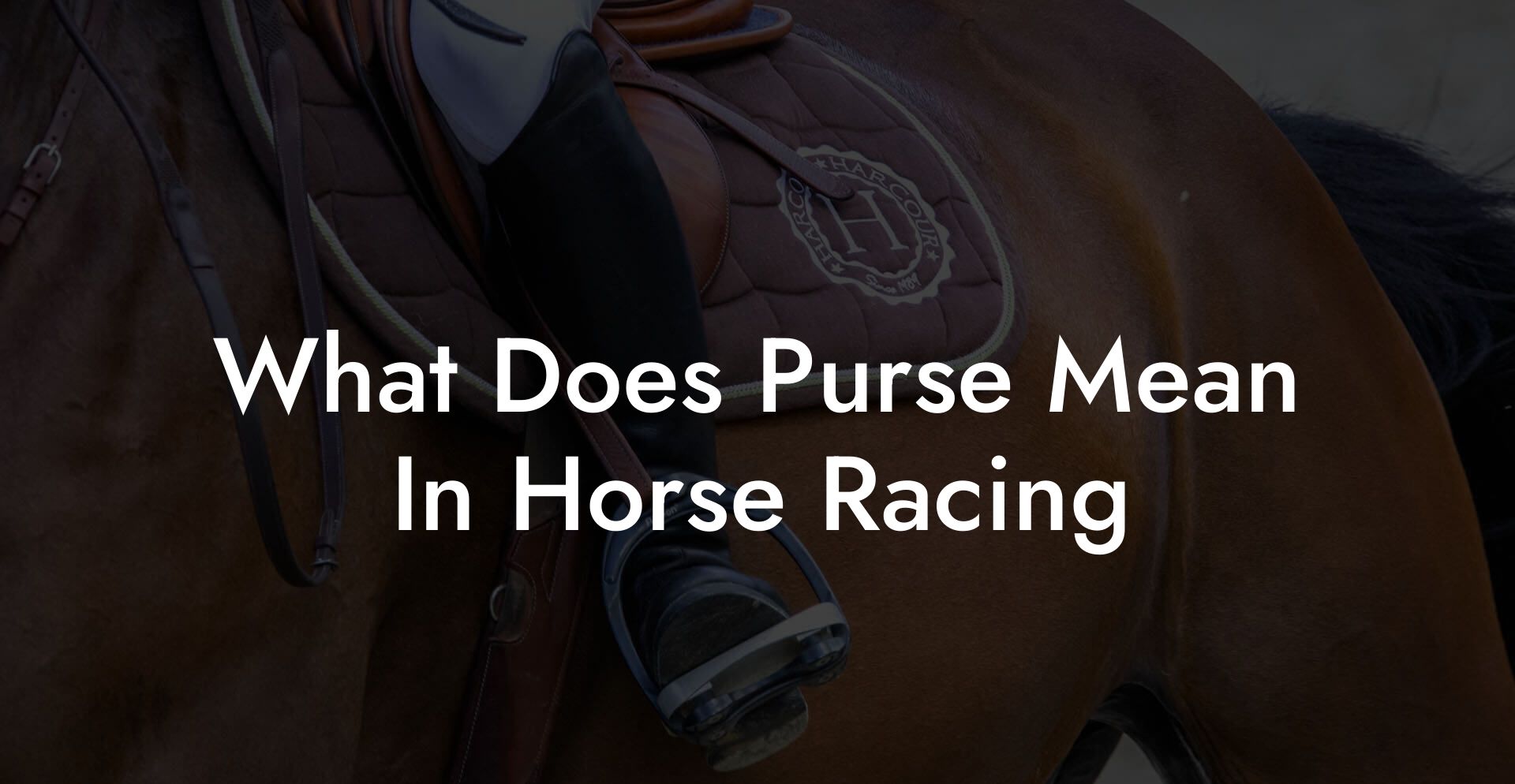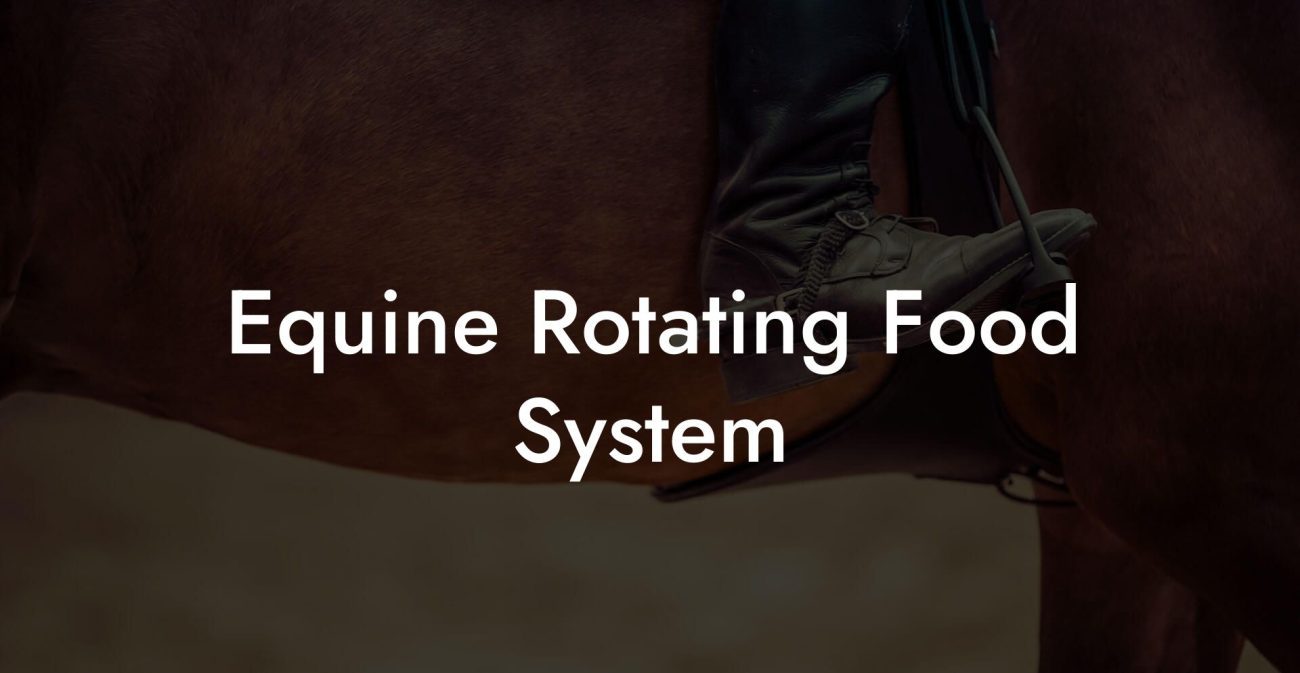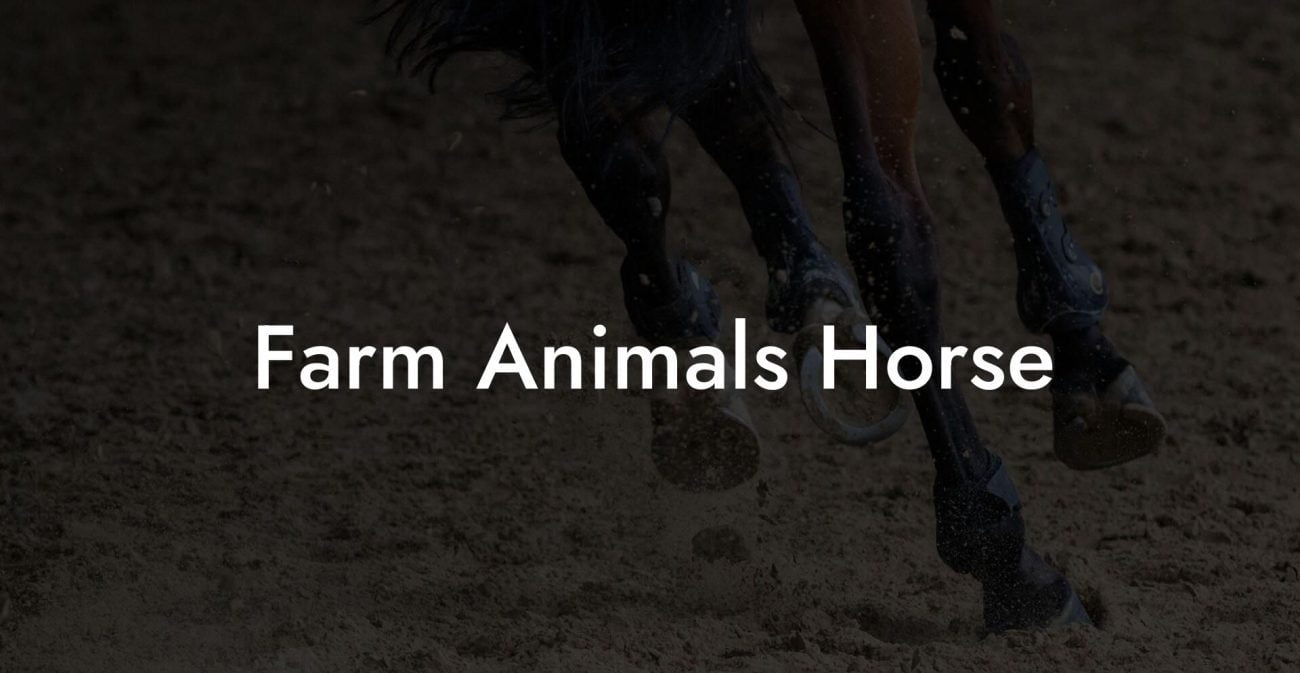Racing beyond the finish line, the thrill of the track, and yes—a hefty treasure trove of prize money—all swirl together into one exhilarating question: “What does purse mean in horse racing?” From the echoing roars of the grandstands to the meticulous care of every champion’s stable, the word “purse” isn’t just a nod to monetary winnings; it’s the lifeblood that fuels dreams, innovation, and even the everyday care of the magnificent equine athletes we adore. If you’re a Gen-Z or millennial racing enthusiast whose heart beats for both high stakes and the art of caring for your horse, you’re in for a wild ride.
Quick Links to Useful Sections
- Understanding the Purse in Horse Racing: A Primer
- The Historical Evolution of the Horse Racing Purse
- Breakdown of the Purse: How Prize Money is Distributed
- The Economic Impact: More Than Just Money on the Line
- Key Stakeholders and Their Roles in the Purse Economy
- Owners
- Trainers
- Jockeys
- Sponsors and Stakeholders
- Unpacking Horse Racing Terminology: Beyond the Purse
- Furlong
- Handicap
- Grade
- Caring for Champions: How Horse Racing Success Fuels Superior Equine Care
- Analyzing Successful Races: What a Big Purse Can Mean
- Trends and the Future of Horse Racing Purses
- Resources and Community Support: Your Next Steps
- Strategies for Maximizing the Benefits of the Purse Economy
- Stay Informed
- Diversify Your Interests
- Build a Network
- Invest in Innovation
- Integrating Technology and Tradition: The New Age of Racing
- Champion Stories: Real-Life Triumphs Fueled by the Purse
- Learning Lessons: From the Track to Your Stable
- Frequently Asked Questions About Horse Racing Purses
- Your Journey to Racing Mastery and Equine Excellence
Understanding the Purse in Horse Racing: A Primer
When you hear “purse” in the context of horse racing, what comes to mind? Is it a chic designer accessory carried by high rollers, or is it something deeper—a representation of victory, prestige, and opportunity? In horse racing, the purse refers to the total prize money offered in a race. It’s a critical component of the sport, reflecting the scale of the event, the quality of the competitors, and the overall stakes of the race.
More than just cold, hard cash, the purse is a powerful symbol of success. For owners and trainers, it means the potential to reinvest in better facilities, world-class training regimes, and even top-notch care for their horses. For jockeys, the purse represents a tangible reward for all those hours of mastering the saddle and channeling raw adrenaline through every race.
As you dive into the world of horse racing, think of the purse as the ultimate trophy—a blend of financial incentive and the cultural honor of participating at the highest echelons of the sport. Whether you’re placing bets, cheering on your favorite steed, or planning your next stable upgrade, understanding the purse is key to unlocking a deeper appreciation for the sport.
The Historical Evolution of the Horse Racing Purse
Horse racing’s roots trace back thousands of years, and like every great tradition, the concept of the purse has evolved over time. Early races often rewarded the victors with tangible tokens—from livestock to medals—that signified honor and status. As the sport began to professionalize, especially in the 18th and 19th centuries, monetary prizes became the gold standard.
The modern purse, as we know it today, emerged from a blend of commercial sponsorships and increased media attention. Major races, now global spectacles, offer purses that can reach millions of dollars. This evolution not only amplified the stakes on the track but also transformed how race winnings are distributed, celebrated, and reinvested in the broader industry.
Today, some of the richest purses in the world can be found in prestigious events like the Kentucky Derby or the Breeders' Cup. These vast sums are used both as a reward for exceptional performance and as a driving force for innovation in equine care, training techniques, and overall race strategy. Understanding this historical context gives enthusiasts a richer perspective on the high-octane drama of every race.
Breakdown of the Purse: How Prize Money is Distributed
Ever wondered how the prize money from a race is actually split up? As simple as it may seem, the distribution of the purse is a fascinating dance of percentages and agreements, crucial for maintaining fairness across the board.
Typically, a significant percentage of the purse goes directly to the race winner. The winning owner pockets a large share, with jockeys, trainers, and even the stable crew earning their kick based on preset contracts and percentage splits. For instance, it’s common for jockeys to secure roughly 10% of the earnings awarded to the owner. The remaining purse is often distributed among the runners-up, with second and third place receiving smaller but still meaningful amounts.
This breakdown not only motivates teams to push beyond their limits but also reinforces a culture of excellence across every layer of the horse racing world. Be it a scrappy underdog or a seasoned champion, every participant knows that the purse symbolizes a fair and rigorous meritocracy. This transparent process also plays a pivotal role in funding further developments in horse care, from advanced nutritional regimes to cutting-edge training equipment.
The Economic Impact: More Than Just Money on the Line
The purse is not a standalone entity; it’s part of a larger ecosystem that drives the entire industry. Consider the financial ripple effects that extend far beyond the race track. When a prestigious race with a hefty purse occurs, the economic benefits are felt by many stakeholders. Owners reinvest their winnings into better facilities, trainers acquire state-of-the-art equipment, and jockeys use the money to fund training courses and even improve personal performance.
For the broader community, including betting enthusiasts and sponsors, the purse fuels an economic cycle that stimulates local businesses, media outlets, and sporting communities. In fact, a thriving purse economy can lead to better resources for horse care as well. With more funds available, owners can opt for higher-quality feed, improved veterinary care, and enhanced stable conditions that directly benefit the horses.
In essence, the purse is a catalyst for growth and innovation. It drives investment in cutting-edge training methods and state-of-the-art horse care techniques, ensuring that every race is not just a contest of speed, but also a showcase of superior animal welfare and sportsmanship.
Key Stakeholders and Their Roles in the Purse Economy
The purse is a nexus where various stakeholders converge, each playing a unique role in the horse racing tapestry. Understanding these key players helps demystify the economics of the purse.
Owners
Owners are the visionaries who invest not only their money but also their hearts in their horses. The purse represents the ultimate reward for taking a chance on a promising equine athlete. It gives them the financial muscle to reinvest in superior care, updated stables, and even the next generation of promising horses.
Trainers
Often the unsung heroes behind every winning streak, trainers meticulously plan every stride. They design training programs that blend modern techniques with time-honored traditions, and their portion of the purse is often reinvested in top-tier veterinary care, nutritional supplements, and cutting-edge performance analysis.
Jockeys
Silver-tongued risk-takers in the saddle, jockeys live for the thrill of the ride. Their earnings, typically a percentage of the purse, are well worth the grueling hours of practice and the inherent dangers of the sport. Their commitment to optimizing performance simultaneously drives the need for better personal health and fitness regimes, reinforcing the cycle of quality care.
Sponsors and Stakeholders
From betting companies to corporate sponsors, these stakeholders inject additional funds that often boost the purse. This symbiotic relationship not only raises the profile of horse racing events but also enhances the overall quality of the sport—from better media coverage to improved community events.
Ultimately, each stakeholder’s contribution creates a layered ecosystem where prize money is not just a reward but a reinvestment into the lifelong cycle of training, racing, and caring for horses.
Unpacking Horse Racing Terminology: Beyond the Purse
To truly master the jargon of the racing world, it’s important to be fluent in the lingo. Terms like “furlong,” “handicap,” and “grade” are thrown around with the same casual nonchalance as “purse.” Here’s a quick guide to some of the most essential horse racing terms:
Furlong
A furlong is a measure of distance—approximately one-eighth of a mile. When you hear commentators mention “six furlongs,” they’re talking about the length of the race.
Handicap
Handicap races level the playing field by assigning weights to horses based on their past performance. It’s a clever way to ensure that every competitor, regardless of their track record, gets a fair shot at glory.
Grade
Races are classified into grade levels—from Grade 1, which represents the highest quality of racing, down to lower tiers. Grade 1 races typically offer the largest purses and attract top-tier talent.
Becoming conversant in these terms not only enriches your viewing experience but also deepens your understanding of how the purse fits into the broader spectrum of race dynamics. In this sense, every term is another piece of the puzzle in decoding the sport’s intricate language.
Caring for Champions: How Horse Racing Success Fuels Superior Equine Care
While the shimmer of a hefty purse can captivate the imagination, the real story often unfolds behind the scenes—where dedicated teams work tirelessly to nurture and care for the unsung heroes of the track: the horses themselves. For many owners and trainers, the winnings from a premium purse are directly reinvested in equine care.
Quality horse care encompasses a wide array of practices, from state-of-the-art nutritional planning to advanced veterinary treatment. A well-cared-for horse is not only healthier and happier, but also more likely to perform at peak levels. Investments may include enhanced stabling facilities, specialized training equipment, comprehensive health checkups, and even innovative therapies like physiotherapy and acupuncture.
For today's Gen-Z and millennial enthusiasts who value transparency and holistic care, the reinvestment of purse earnings into horse care underscores a commitment to sustainable sportsmanship. It’s an exciting cycle where success on the track powers advancements in equine welfare, ensuring that every forked stride is supported by expert care and compassion.
Analyzing Successful Races: What a Big Purse Can Mean
There’s an undeniable buzz when a race promises a jumbo purse. But what does that really mean for the competitors and the spectators? Let’s break it down by looking at some high-stakes examples:
In races where the purse ascends into the six or seven figures, every participant is pushed to bring their absolute best. It’s not uncommon for top-tier horses and their teams to fine-tune their training regimens and intensify their focus when the stakes are exceptionally high. A large purse also serves as a beacon, attracting some of the most talented jockeys and trainers from across the globe. This confluence of expertise not only sets the stage for a nail-biting contest but also elevates horse care to a central theme, as teams invest heavily in the overall well-being of their champions.
Data analytics, advanced imaging technology, and even wearable tech for horses are now standard tools in evaluating performance. The bigger the purse, the bigger the investment in ensuring that every competitor is at their absolute best, both physically and mentally. For the racing community, these mega-event races are more than just competitions—they’re a showcase of innovation, dedication, and the transformative power of strategic financial investment.
Trends and the Future of Horse Racing Purses
As horse racing steps into the modern era, newer trends are emerging that will reshape the landscape of the purse economy. Technological advances, changing market dynamics, and innovative sponsorship models are all converging to redefine what a purse represents.
One notable trend is the rise of digital betting platforms and blockchain-based systems, which are enhancing transparency in how prize money is allocated. These innovations not only instill greater trust among stakeholders but also open new revenue streams that can boost purse sizes even further.
There’s also a growing emphasis on sustainable practices in horse racing. As more attention is given to animal welfare and ethical practices, part of the purse in certain races is now allocated specifically for the long-term care and rehabilitation of horses. This philanthropic angle is particularly appealing to a modern, socially conscious audience.
Looking forward, the purse will likely continue to be a symbol of not only athletic prowess but also corporate responsibility and advanced animal care. With emerging markets and shifting sponsorship paradigms, there’s no doubt that future purses will reach even greater heights, further cementing the relationship between financial success and holistic equine well-being.
Resources and Community Support: Your Next Steps
So, what if you’re fired up by the idea of a big purse and also care about the horses behind the scenes? This is where community engagement and resource-sharing come in. There are numerous organizations, clubs, and online forums dedicated to every facet of horse racing—from understanding the nuances of purse distribution to mastering the art of equine care.
Start by following horse racing news outlets and social media pages that offer behind-the-scenes looks at racing events and training facilities. Many high-profile stables and trainers now regularly share tips, videos, and advice on how to maintain high standards of horse care, ensuring that your favorite equine athletes receive the best support possible.
Additionally, consider joining local or online communities where you can network with industry professionals, learn about upcoming races, and even discover volunteer opportunities at stables or equine therapy centers. These networks not only provide expert insights into harnessing the power of the purse but also help you stay abreast of the latest trends and breakthroughs in horse care.
If you’re looking for hands-on experiences, attend horse racing events, stable tours, or workshops on equine nutrition and veterinary care. These events are golden opportunities to see first-hand how purse earnings are reinvested into the sport and the animals that drive it.
Strategies for Maximizing the Benefits of the Purse Economy
Whether you’re an owner, trainer, jockey, or an enthusiastic fan actively participating in betting pools, understanding and leveraging the purse economy comes with its own strategic advantages. Here are some actionable strategies:
Stay Informed
Follow industry blogs, join horse racing forums, and subscribe to newsletters that dissect recent races, offering insights into purse distributions, emerging trends, and the latest in equine health developments. Knowledge is power, and being informed about the current state of the purse economy can sharpen your decision-making whether you’re investing in a racehorse or planning training regimens.
Diversify Your Interests
An ideal racing enthusiast doesn’t just focus on the tracks; they also invest time and energy in understanding equine care. From diet plans and exercise routines to veterinary breakthroughs, being well-versed in horse care can give you a competitive edge when it comes to identifying potential champions.
Build a Network
Connect with professionals across the spectrum of horse racing—from seasoned trainers and jockeys to veterinarians and nutrition experts. An active network not only provides insider knowledge but also opportunities to collaborate on advancing both racing success and superior horse care.
Invest in Innovation
Stay open to new technologies and methodologies that promise to revolutionize the sector. Tools like performance-tracking wearables and innovative nutritional supplements are constantly evolving and can have a direct impact on how purse earnings are funneled back into enhancing horse performance and well-being.
By embracing these strategies, you empower yourself to make the most of the purse economy—turning every race into an opportunity for learning, growth, and ultimately, better equine care.
Integrating Technology and Tradition: The New Age of Racing
The horse racing world is experiencing a digital renaissance. While tradition remains the backbone, technology is fast reshaping how the sport operates—especially when it comes to purse management and horse care. Digital platforms now offer real-time tracking of races, performance analytics, and even virtual training sessions, all of which help optimize strategies both on and off the track.
For the tech-savvy Gen-Z and millennial community, this integration is particularly exciting. Imagine a future where augmented reality helps you visualize a horse’s performance data in real time, or blockchain ensures transparency in the distribution of purse funds. These innovations not only make the sport more engaging but also promise to enhance the quality of care provided to the horses by ensuring that every dollar spent is accounted for.
Tradition and technology aren’t mutually exclusive—they’re two sides of the same coin. By harnessing modern tech while retaining the time-tested wisdom of seasoned trainers and veterinarians, the horse racing industry is set to create an ecosystem where the pursuit of glory goes hand-in-hand with comprehensive animal care.
Champion Stories: Real-Life Triumphs Fueled by the Purse
There’s nothing quite as inspiring as stories of champions who defied the odds. Consider the saga of a once-overlooked racehorse that, through sheer determination, state-of-the-art care, and a bit of good fortune, won a race with a purse that transformed its team’s fortunes.
One such case involved a young horse from a small stable with dreams larger than its humble beginnings. With dedicated trainers, advanced nutritional plans, and a commitment to holistic care, this underdog rose to challenge the industry's best. When the day of the race came, every inch of effort—from the sweat in the stable to the expertise of the jockey—culminated in a breathtaking victory that not only increased the purse but also put the tiny stable on the map.
Stories like these illuminate the true impact of the purse: it’s a lifeline, a promise that hard work, innovation, and uncompromising care for an athlete’s well-being will eventually be rewarded. They underscore the fact that behind every hefty purse lies a network of support, dedication, and community spirit.
Learning Lessons: From the Track to Your Stable
Even if you’re not running a race for a multi-million dollar purse, there are valuable lessons to be learned from the dynamics of high-stakes horse racing. The same principles that apply to maximizing earnings in a grand event can be translated into effective strategies for everyday horse care.
For instance, the meticulous planning, dual emphasis on performance and welfare, and the constant pursuit of innovation on the track can serve as a blueprint for managing your own stable. Whether you’re a hobbyist caring for a cherished horse or an aspiring professional in the equine industry, the ethos behind a well-structured purse system inspires a comprehensive, forward-thinking approach to animal care.
By adopting a holistic mindset—where financial gains are reinvested into practical, high-quality care—you ensure that every horse under your guidance is given the best opportunity to thrive. This symbiotic cycle of reward and reinvestment is the secret sauce behind the enduring legacy of horse racing.
Frequently Asked Questions About Horse Racing Purses
Below are some frequently asked questions that help demystify the complex world of horse racing purses and their broader implications:
1. What exactly does “purse” mean in horse racing?
In horse racing, the term “purse” refers to the total amount of prize money that is distributed among the top finishers of a race. It acts as both an incentive and a marker of the race’s prestige.
2. How is the purse typically divided?
The purse is usually split among the top finishers, with the winner receiving the largest share. The remaining funds are then distributed among the other finishers based on predetermined percentages, ensuring rewards for various levels of performance.
3. Why do purses vary so much between different races?
Purse sizes depend on several factors including the race’s prestige, sponsorship deals, the number of entries, and the overall history or significance of the race. Higher-profile events naturally come with larger purses.
4. How do purses impact horse care?
A significant purse can translate into better funding for all aspects of equine care—from advanced veterinary treatment and specialized nutrition to improved training facilities. The reinvestment of winnings ensures continual improvements in the overall welfare of the horses.
5. Can a larger purse attract better quality horses and talent?
Absolutely. A larger purse is a powerful motivator. It attracts top-tier owners, trainers, and jockeys, resulting in a more competitive field and a stronger focus on excellence both on the track and in horse care.
6. Are there any risks associated with focusing too much on the purse?
While the purse is a significant factor, focusing solely on prize money can sometimes overshadow the importance of horse welfare. A balanced approach that sees financial rewards as tools for furthering high-quality care is key to long-term success.
7. How have technological innovations affected purse management?
Innovations such as real-time race analytics, digital betting platforms, and blockchain technology have increased transparency in purse allocation and are paving the way for more efficient reinvestment strategies in the overall ecosystem of the sport.
The purse is thus not just a number—it’s a multifaceted component that integrates financial success with the welfare and performance excellence of every horse in the race.
Your Journey to Racing Mastery and Equine Excellence
Embracing the multifaceted world of horse racing means celebrating more than just the thrill of victory—it’s about understanding how every dollar in the purse contributes to a legacy of excellence, innovation, and the unwavering care of the athletes on four legs. Whether you’re analyzing the finer points of purse distribution, soaking up the latest trends in digital betting, or dedicating time to learn the best practices in horse care, your journey is one of continuous learning and transformative experiences.
The purse is not merely a sum of money—it’s a symbol of ambition, hard work, and the shared passion of a community that values every stride taken on the track and every moment spent tending to a champion. With each race, each training session, and every conversation with fellow enthusiasts, you contribute to an ecosystem that thrives on mutual support, innovation, and sustainable care for our equine stars.
So, whether you dream of the adrenaline-pumping excitement of the race or the quieter satisfaction of ensuring your horse is receiving the best possible care, remember that you’re part of a vibrant tapestry where financial success and ethical responsibility go hand in hand. Your journey to mastering horse racing and achieving equine excellence is just beginning. Embrace the ride!
Step into a world where every race, every purse, and every act of care amplifies your passion. Connect, learn, and let your enthusiasm drive you to not only witness greatness on the track but also to champion the well-being of the horses that make it all possible. The adventure starts now—saddle up and ride toward a future fueled by knowledge, integrity, and unbridled excitement.













